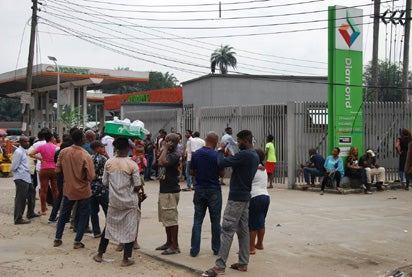
 Long queque at Diamond ATM gallery along Aba Road in Port Harcourt weekend. Photo: Nwankpa Chijioke
Long queque at Diamond ATM gallery along Aba Road in Port Harcourt weekend. Photo: Nwankpa Chijioke
The rapid spread of COVID-19 has disrupted businesses, communities, education, livelihood and the lives of billions of people worldwide. As individuals and businesses react and desperately try to minimize the impact and spread of the virus, the government is also taking action. Only recently, the Lagos state government announced the immediate closure of open markets and stores, with the exception of those that sell essential items.
While this move is highly commendable, at this point, it is imperative that the government look into other payment and delivery methods to ensure that consumers are still able to stock up on essential items like food, drugs, water, toilet paper, soap, etc and business owners do not completely shut down and run at a total loss during this period.
Also read: COVID-19: Akin Alabi provides emergency relief package for Egbeda/Ona Ara
For instance, restaurants across the nation have not been mandated to close up, but just like other nations with higher cases of COVID-19 than Nigeria, it is only a matter of time before this will happen. This will not only affect the lives of these business owners but that of consumers who rely on them for daily upkeep.
Somewhere in Lagos, a small scale restaurant owner is currently on the verge of panic, as she fearfully awaits the time when her business will be forced to shut down. How will she feed and provide for her children if she is mandated to close up her business in the coming weeks?
In Onitsha, a major pharmaceutical store owner is worried about how to keep his business running as most of his customers are no longer interested in stepping out of their houses, talk more about entering the ever-bustling Onitsha main market to purchase pharmaceutical products.
Down in Ibadan, a vegetable oil distributor is wondering how he would continue to cater to his family, as fewer people are coming out to buy. On and on, the list of business owners who are currently at their wits ends goes.
Today, walking into a shopping mall like Shoprite is no longer as easy as it was a few weeks ago, as consumers have to join long queues and wait turns to get in, in line with the government directive of not more than 20 people in a gathering at a time.
With all these fears and inconveniences in place, finding an alternative means of buying and selling that reduces human-to-human contact has become a must.
In countries like the U.S, the U.K and a few European countries, restaurants and other retail companies are already using the contactless payment method to reduce the impact of the virus in the daily lives of citizens. While restaurants stay open, customers are however not allowed in. The staff in charge of preparing food or making deliveries take all the necessary precautions to protect themselves and consumers, by wearing preventive gear and avoiding or having limited contact with consumers. This sort of delivery allows delivery personnel to leave packages at the doorstep of consumers, as payment would have already been made online.
Already, e-commerce platforms like Jumia Nigeria already have the contactless delivery option in place, with many consumers opting for it over POD or the regular online payment that would still need verification and physical receipt of purchased products. They also have the Jumia Food platform, which has restaurants all over the country as partners, thereby providing several food options for consumers.
Jumia’s contactless delivery services are safe, with strict hygiene practices that ensure all packages leaving the warehouse are protected. With its integrated logistics network, Jumia makes these deliveries available to consumers all over the country, including remote and rural areas. This is important especially for elderly and sick people.
At a time like this, it is important that the government steps in to implement laws that allow business owners to keep functioning on grounds that they partner with delivery service providers to render contactless payment options.
Without these measures in place, the coronavirus epidemic will not only have a temporary effect but will leave millions of Nigerians struggling to get back on their feet even years after the virus has been contained.
Join Television Nigerian Whatsapp Now
Join Television Nigerian Facebook Now
Join Television Nigerian Twitter Now
Join Television Nigerian YouTUbe Now





